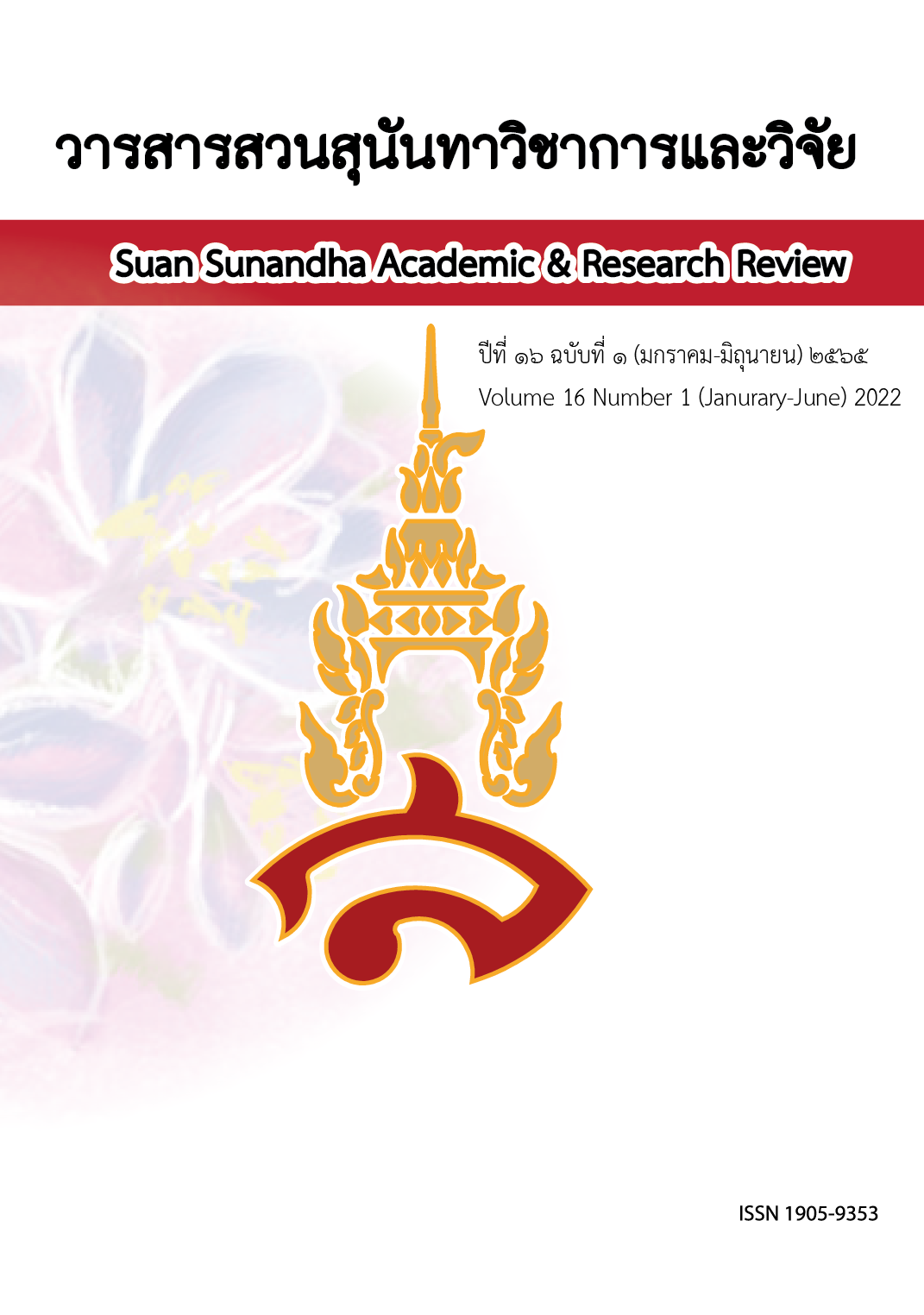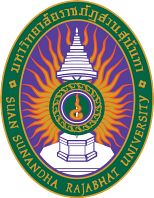การพัฒนาแบบวัดความเครียดทางวิชาการของนิสิตบัณฑิตศึกษา
คำสำคัญ:
ความเครียด, ความเครียดทางวิชาการ, เกณฑ์ปกติระดับชาติบทคัดย่อ
การวิจัยในครั้งนี้มีวัตถุประสงค์ 1) เพื่อพัฒนาแบบวัดความเครียดทางวิชาการของนิสิตบัณฑิตศึกษา 2) เพื่อตรวจสอบคุณภาพของแบบวัดความเครียดทางวิชาการของนิสิตบัณฑิตศึกษา และ 3) เพื่อสร้างเกณฑ์ปกติของแบบวัดความเครียดทางวิชาการของนิสิตบัณฑิตศึกษา กลุ่มตัวอย่าง คือ นิสิตบัณฑิตศึกษาจาก 4 ภูมิภาคของประเทศไทย จำนวน 240 คน ซึ่งได้มาจากการสุ่มหลายขั้นตอน เครื่องมือที่ใช้ในการวิจัย คือ แบบวัดความเครียดทางวิชาการของนิสิตบัณฑิตศึกษา วิธีดำเนินการวิจัย ขั้นตอนที่ 1 พัฒนาและตรวจสอบคุณภาพองค์ประกอบและตัวบ่งชี้ และสร้างแบบวัดความเครียดทางวิชาการของนิสิตบัณฑิตศึกษา ขั้นตอนที่ 2 การตรวจสอบคุณภาพของแบบวัด ด้านความตรงเชิงเนื้อหา ค่าอำนาจจำแนก ค่าความเชื่อมั่น และความตรงเชิงโครงสร้างของโมเดลการวัด ขั้นตอนที่ 3 เป็นการพัฒนาเกณฑ์ปกติระดับชาติของแบบวัด วิเคราะห์ข้อมูลโดยใช้โปรแกรมสำเร็จรูป
ผลการวิจัย 1) แบบวัดความเครียดทางวิชาการ ประกอบด้วย 4 องค์ประกอบ 9 ตัวบ่งชี้ 21 ข้อคำถาม มีความเหมาะสมอยู่ในระดับมากถึงมากที่สุด 2)ความตรงเชิงเนื้อหา IOC อยู่ระหว่าง 0.60 - 1.00 ค่าอำนาจจำแนกอยู่ระหว่าง 0.334 – 0.823 และความเชื่อมั่น 2 ครั้ง มีค่าเท่ากับ 0.951 และ 0.921 ตามลำดับ ความตรงเชิงโครงสร้าง โดยการวิเคราะห์องค์ประกอบเชิงยืนยันอันดับที่ 2 พบว่า โมเดลความเครียดทางวิชาการของนิสิตบัณฑิตศึกษามีความสอดคล้องกับข้อมูลเชิงประจักษ์ โดยมีค่าสถิติทดสอบ Chi-square = 23.660, p-value = 0.129, CFI = 0.996, TLI = 0.992, RMSEA = 0.040, SRMR = 0.028 3) เกณฑ์ปกติระดับชาติของแบบวัดความเครียดทางวิชาการของนิสิตบัณฑิตศึกษา = 61.07, S.D. = 19.17 มีช่วงคะแนนเปอร์เซ็นไทล์ (Percentile Rank) อยู่ระหว่าง 1.3-100.0 และมีช่วงคะแนนทีปกติ (Normalized T-score) อยู่ระหว่าง 28 - 89
เอกสารอ้างอิง
Adom, D., Chukwuere, J., & Osei, M. (2020). Academic Stress among Faculty and Students in Higher Institutions. Pertanika Journal of Social Sciences & Humanities, 28(2).
Bedewy, D., & Gabriel, A. (2015). Examining perceptions of academic stress and its sources among university students: The Perception of Academic Stress Scale. Health psychology open, 2(2).
Boswell, W. R., Olson-Buchanan, J. B., & LePine, M. A. (2004). Relations between stress and work outcomes: The role of felt challenge, job control, and psychological strain. Journal of Vocational Behavior, 64(1), 165-181.
Clark, C. (205). Percentile. In B.S. Everitt, & D.C. Howell (Eds.). Encyclopedia of Statistics in Behavioral Science, (pp. 207-227). Chichester: Wiley.
Fernández-Hileman, M., Corengia, A., & Durand, J. (2014). University desertion and retention: a bibliographical discussion. Thinking Psychology, 10(17), 85-96.
Gangloff, B., & Mazilescu, C. A. (2014). Normative characteristics of perceived self-efficacy. Social Sciences, 6(4), 139.
Gunawati, R., Hartati, S., & Listiara, A. (2010). The relationship between the effectiveness of student-lecturer thesis supervisor and stress in writing a thesis for students of the Psychology Study Program, Faculty of Medicine, Diponegoro University. Journal of Psychology Undip, 3(2), 93-115.
Hair, J., Blak, W. C., Barbin, B. J., Anderson, R. E., & Tatham, R. L. (2010). Multivariate data analysis. New Jersey: Upper Sandle River, Prentice Hall.
Liu, F. (2017). Academic stress and mental health among adolescents in Shenzhen, China Doctoral dissertation. Queensland University of Technology.
Peñacoba, C., & Moreno-Jiménez, B. (1999). The university stressors scale (EEU) A proposal for the evaluation of stress in specific population groups. Anxiety & Stress, 5(1), 61-78.
Prachanametha, S. (2008). Parents' expectations towards academic administration of Bang Pho Nuea School, Samkhok District, Pathum Thani Province. . independent research Department of Educational Administration Phranakhon Rajabhat University. (In Thai).
Siriyotha, S. (2015). Development of a social responsibility measure for students, Faculty of Education Institute of Physical Education. . Master's Degree Thesis Department of Research and Educational Evaluation Kanchanaburi Rajabhat University. (In Thai).
Stankovska, G., Dimitrovski, D., Angelkoska, S., Ibraimi, Z., & Uka, V. (2018). Emotional Intelligence, Test Anxiety and Academic Stress among University Students. Bulgarian Comparative Education Society.
Sun, J., Dunne, M. P., Hou, X. Y., & Xu, A. Q. (2011). Educational stress scale for adolescents: development,validity, and reliability with Chinese students. Journal of psychoeducational assessment, 29(6), 534-546.
Tabachnick, B. G., & Fidell, L. S. (2007). Using multivariate statistics. Boston: Pearson Education.
Tan, J. B., & Yates, S. (2011). Academic expectations as sources of stress in Asian students. Social Psychology of Education, 14(3), 389-407.
Taufik, T., Ifdil, I., & Ardi, Z. (2013). Condition of Academic Stress of State Senior High School Students in Padang City. Journal of Counseling and Education, 1(2), 143-150.
ดาวน์โหลด
เผยแพร่แล้ว
รูปแบบการอ้างอิง
ฉบับ
ประเภทบทความ
สัญญาอนุญาต
ลิขสิทธิ์ (c) 2022 สถาบันวิจัยและพัฒนา มหาวิทยาลัยราชภัฎสวนสุนันทา

อนุญาตภายใต้เงื่อนไข Creative Commons Attribution-NonCommercial-NoDerivatives 4.0 International License.
บทความที่ได้รับการตีพิมพ์เป็นลิขสิทธิ์ของ สถาบันวิจัยและพัฒนา มหาวิทยาลัยราชภัฎสวนสุนันทา
ข้อความที่ปรากฏในบทความแต่ละเรื่องในวารสารวิชาการเล่มนี้เป็นความคิดเห็นส่วนตัวของผู้เขียนแต่ละท่านไม่เกี่ยวข้องกับมหาวิทยาลัยราชภัฎสวนสุนันทา และคณาจารย์ท่านอื่นๆในมหาวิทยาลัยฯ แต่อย่างใด ความรับผิดชอบองค์ประกอบทั้งหมดของบทความแต่ละเรื่องเป็นของผู้เขียนแต่ละท่าน หากมีความผิดพลาดใดๆ ผู้เขียนแต่ละท่านจะรับผิดชอบบทความของตนเองแต่ผู้เดียว






